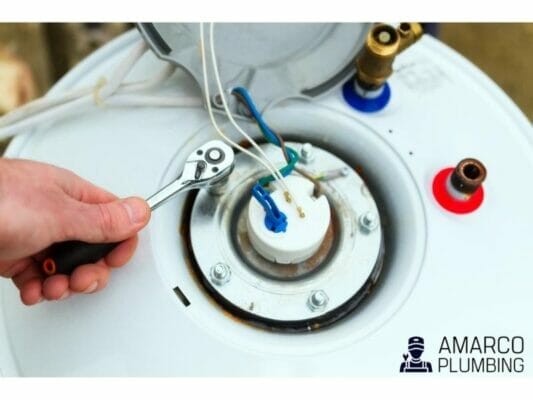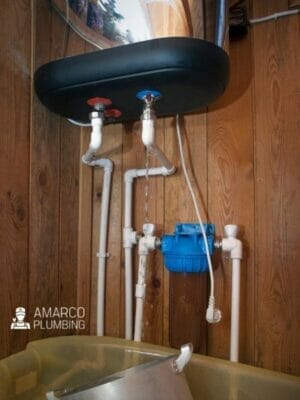Disclaimer: This post may contain affiliate links, meaning we get a small commission if you make a purchase through our links, at no cost to you. For more information, please visit our Disclaimer Page.
You won’t have hot water if your water heater breaks, but you can still shower with cold water. Alternatively, you can keep your bath warm by using various heating methods that you already have at home.

Table of Contents
Can You Still Use Water If The Water Heater Is Off?
You can continue to use the water if the heater is turned off. Even if the taps do not provide hot water, you will have running water. Water heaters that are tankless, on the other hand, provide a steady supply of hot water regardless of whether the heater is turned on or off.
However, the smaller units that are commonly seen will not provide enough hot water to serve most households. Only one faucet will be served at a time.
Of course, if you use water from the water heater after it is turned off, for a bath or shower, it will quickly turn cold water; if you leave it alone, it will take hours. It’s also worth noting that when it does start to get cooler, it won’t do so gradually; when the heater is off, it gets cold rather quickly.
Because of the absence of water pressure, the only way to get the water out of the water heater is to use the drain. If you’re desperate, you may fill buckets and use them to fill the tub. However, it might be better for hand-washing dishes.
If your water heater has a gate valve, it will most likely not completely shut off the water, resulting in a continual trickle of water into (and out of) the heater.
As long as there is water in the tank, it will want to escape, so drain it, but make sure there is enough room for air to get in to let the water go.
You won’t be able to utilize 1-handle Delta or Moen tub or shower valves until pressure is restored to the hot water side of the plumbing system.
If you try to get “warm” water from any faucet by opening both hot and cold sides at the same time, cold water will bleed through into the hot side and into the water heater.
Can You Shower Using A Broken Water Heater?
When your water heater breaks, you will still have cold water running. It is entirely safe to shower, wash dishes or clothing, or do anything else that necessitates the use of a water heater. Your water heater is intended to be used only when it is needed.
Your water heater tank’s heating element is most likely all that needs to be replaced. It’s not difficult to accomplish. Alternatively, you can purchase a special shower head that plugs into an outlet and rapidly heats the water.
In the meantime, if you need warm water, you can bathe by heating the water up on the stove, transferring it to a pail, and bending someplace in the bathroom. It may sound desperate and old-fashioned, yet it can help provide a realistic solution in an emergency.
The following are the steps you should take as soon as you notice that your water heater is broken:
Stop The Flow Of Water
Determine the location of the cold water supply pipe. This pipe connects the main water line to the water heater’s top. When the tank is full, the water should stop flowing, but due to the rupture, the tank pumps the water out into the room as soon as it enters from the pipe.
Turn the valve clockwise until it can no longer switch to turn off the cold water supply line. This will halt the flow of water that is still filling the water heater and spilling out of the burst seams.
Turn Off The Power
If you leave the electric or gas heating element on, you may be creating a new hazard in your home. After the water in the tank has drained out, it can stay warm for a long time. This is inefficient and, in the worst-case scenario, can result in a fire.
The heating element generally switches off when the water reaches a certain temperature, but this is unlikely to happen if your tank bursts due to a faulty thermostat. Locate and switch the breaker for the hot water tank in your electrical breaker box.
If the water heater is powered by gas, disconnect the gas line and leave the house until the natural gas smell has entirely gone away.
Take Photographs Of The Scene
Before you start cleaning up the water, take photos of the area and the damage, including the entire leak, damage to your home, furniture, and any other valuables, and anything else you think will help you with your home’s insurance claim.
Drain The Water
Connect a hose to the tank’s bottom drain valve and direct it to a basement drain or a low spot outdoors. Open the pressure relief valve to prevent a vacuum from forming inside the tank.

Is A Leaking Water Heater Dangerous?
A leaky water heater is inconvenient since it can give off a hazardous vibe and make taking a shower to appear dangerous.
If a fitting or a drain valve on the heater leaks, it will theoretically not impair its longevity, and you can use it as-is for years. Of course, if water damage isn’t a concern.
If the issue is more serious, such as a leak inside the tank, it will only become worse over time, and the unit should be replaced as soon as possible.
Showering when the water heater is leaking is entirely safe. However, determining what is causing the water leak is critical to avoid further water damage.
I’ll walk you through the most common causes of water heater leakage with possible solutions;
Problems with the Water Supply Line
Water heaters are usually fitted with supply lines to ensure that water flows properly into the tank. A leak in this part of the system is the most likely cause, and it can extend to the wiring and/or the tank.
If the supply tubes are broken, you have no choice but to replace them. This can be accomplished by purchasing and replacing replacement tubes.
An Old Tank
Tank water heaters that are more than 15 years old leak more frequently than newer ones. As the unit gets older, the parts wear out, the water loses its warmth, and leaks become more common.
Water heater leaks can occur as a result of corrosion in the tank as it ages. Corrosion occurs as a result, allowing water to escape through fractures.
The only option when a water heater reaches the end of its useful life is to replace it.
Fittings That Leak
A set of fittings can be found where the water lines join the water heater. Another place where leaks are common is this area. In most cases, slightly tightening the fittings solves the problem.
Problems with Pressure Valves and Temperature
The most typical sources of leakage in your water heater are temperature and pressure valves. However, this usually indicates a more serious issue, and in such cases, it is recommended to consult a plumber.
A Rusted-Out Tank
Your water heater’s tank is most likely leaking if none of the preceding suggestions work. This usually happens when there is a hole in the tank, which might be caused by corrosion or a manufacturing fault.
